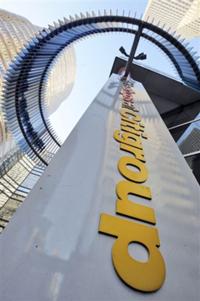Citigroup and Wells Fargo to exit government's financial bailout program, repay combined $45B
- On 12:03 am EST, Tuesday December 15, 2009
NEW YORK (AP) -- The last two major national banks are returning $45 billion in aid to taxpayers, marking the latest step toward recovery for the U.S. financial system.
Citigroup Inc., whose future looked uncertain at the beginning of this year, will repay $20 billion, while Wells Fargo & Co. will pay back the $25 billion it received. Both banks announced significant capital raises in order to repay the money, and the government will also sell the one-third stake it holds in Citigroup.
The move frees the two from the close regulatory scrutiny that accompanied aid from the Troubled Asset Relief Program, which the government put in place at the height of the financial crisis in the fall of 2008. The Treasury Department said that of the $245 billion given to banks under TARP, more than $185 billion will have been repaid including the money from Citigroup and Wells Fargo.
Most other national banks have already exited the program, releasing them from strict compensation limits that banks had said were impeding their ability to attract and retain talent. Just last week Bank of America Corp. said it would repay the $45 billion it owed, as it struggles to find a new CEO to replace Ken Lewis, who is retiring at the end of the year.
New York-based Citigroup is far larger than Wells Fargo, which is based in San Francisco, and the government took a bigger role in its oversight. Citigroup had accepted a total of $45 billion in rescue funds -- among the largest bailout packages received by any bank -- but the government converted $25 billion of that amount into the 34 percent equity stake, which it is now selling.
Allowing the banks to repay the funds and exit TARP signals a vote of confidence from the government in the ability of both banks to stand on their own. It's a far cry from the situation at the beginning of the year, when some analysts were saying Citi could fail and be taken completely over by the government.
"It gets rid of the stigma" for Citi, FBR Capital Markets analyst Paul Miller said.
Citi will sell $20.5 billion in stock and debt to repay the bailout funds. The capital raise will dilute current shareholders by between 20 percent and 25 percent depending on the sale price of the stock and debt, Miller projected.
The bank's shares fell 6.3 percent Monday as investors reacted to the news that existing Citigroup shareholders' stakes would be diluted by the capital raise.
Wells Fargo plans to sell $10.4 billion in new stock, and targets $1.5 billion in asset sales by the end of next year to boost capital. Its announcement came after the close of stock trading, although its shares rose 2 percent in after-hours trading.
A Wells Fargo spokeswoman said the company wasn't making the announcement out of pressure following Citigroup's move.
"We've said for quite some time that we wanted to repay at the appropriate time," she said.
The company said it has paid $1.4 billion in dividends to the government under the terms of its agreement. Handing back the money will save the bank from paying $1.25 billion a year in preferred stock dividends.
The pledges to repay the government came on the day top bankers met with President Barack Obama at the White House. He asked them to consider "every responsible way" to boost lending, particularly to small businesses, and to get behind an overhaul of financial regulation.
Citigroup was among the hardest hit by the credit crisis and rising loan defaults. Now that it's repaid its government loans, Citi will turn its attention to shedding the rest of its troubled mortgage portfolio and other risky assets, which it had separated from its traditional banking business in January.
At the same time, the bank is trying to build up those core businesses such as securities underwriting and institutional banking, where it faces heavy competition from JPMorgan Chase & Co. and other banks that suffered less during the financial crisis. The bank also wants to build up its consumer banking business, which trails competitors like Bank of America in size.
AP Business Writer Ieva M. Augstums in Charlotte, N.C. and AP Economics Writer Martin Crutsinger in Washington contributed to this report.

No comments:
Post a Comment